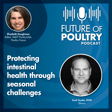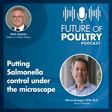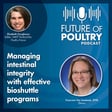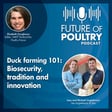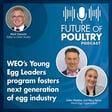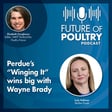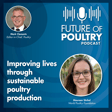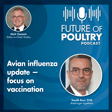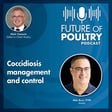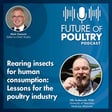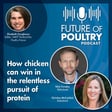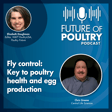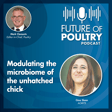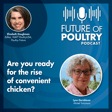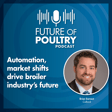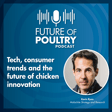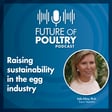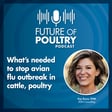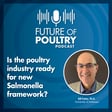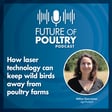Become a Creator today!Start creating today - Share your story with the world!
Start for free
00:00:00
00:00:01

The business case for sustainable chicken
Elizabeth Doughman, editor, WATT PoultryUSA and Poultry Future, and Nancy Himmelfarb, principal, Himmelfarb Sustainability Consulting, highlight the challenges and opportunities involved with marketing the sustainability of chicken products.
Transcript
Introduction to the Podcast Series
00:00:00
Speaker
Hello and welcome to the Future of Poultry podcast series.
00:00:12
Speaker
Hello, I'm Elizabeth Duffman, the editor of What Poultry USA and Poultry Future. In today's episode, my guest is Nancy Himmelfarb, principal at Himmelfarb Sustainability Consulting.
00:00:24
Speaker
Nancy is one of our featured speakers at the 2025 Chicken Marketing Summit, scheduled for July twenty eight through 30th at the DeSoto Savannah in Savannah, Georgia. This one-of-a-kind event explores issues and trends in food marketing and consumer chicken consumption patterns and purchasing behavior.
00:00:42
Speaker
Registration is now open at chickenmarketingsummit.com, and I'd like to encourage everyone to attend.
Nancy Himmelfarb's Professional Journey
00:00:49
Speaker
Thanks for joining us today, Nancy. Thank you. Good to be here.
00:00:53
Speaker
First, could you tell us a little bit about your experience and background? Yes, so I'm a sustainability consultant from Chicago. What I do is I help organizations leverage sustainability to achieve positive impacts, build trust and competitive advantage, all the while reducing risks.
00:01:12
Speaker
I came into sustainability of consulting after a career as a corporate attorney. I was the first full-time attorney and secretary of the board at Williams-Sonoma. So this was a New York stock exchange company that had never had lawyers before, which meant there was a lot of legal work to do, of course.
00:01:27
Speaker
But at the same time, I saw an opportunity to focus on corporate responsibility and sustainability with the company. So I started a whole program there. My tagline was, we're helping our business by helping the environment.
00:01:40
Speaker
Zero budget, but I worked at a grassroots level, found those champions throughout the business to work on, quote, small green steps. These steps became really important, the champions I found, because forced ethics began questioning catalog companies, including Williams-Sonoma, about their paper purchasing policies.
00:02:02
Speaker
And although I hadn't yet convinced Williams-Sonoma to incorporate recycled content into their catalog pages, we were able to be at the table with forest ethics and really have a foundation for Williams-Sonoma's future sustainability commitments and work.
00:02:18
Speaker
I loved this work. I love helping companies do well and do good to sort of use the cliche and realized I was limited in doing this work as an attorney. There are so many risks, opportunities, stakeholder voices beyond legal that help companies to do well and do good.
00:02:37
Speaker
So I transitioned to consulting to be able to address really all three dimensions, the legal, the sustainability and the business most effectively. So what I do now, I help mostly food and ag companies, other companies as well, but mostly food and ag of all sizes from private companies that are new to sustainability to Fortune 500 companies like Conagra, Corteva,
00:03:01
Speaker
Target and Cargill, to name a few, industry associations like the National Chicken Council and the U.S. Roundtable for Sustainable Beef. What I do is I come in with the strategies and communication support that organizations need to navigate sustainability effectively and create value.
00:03:20
Speaker
It's what I call moving from ambition, the general ideas on sustainability, to action, which is focused, credible work that makes business sense and has positive environmental and social impacts.
The Role of Sustainability in Business Success
00:03:33
Speaker
Why should food companies even care about sustainability nowadays? Companies should care because sustainability really is good for business. Studies consistently show that sustainability creates value.
00:03:48
Speaker
There are multiple business drivers that support success and financial performance. Some examples of sustainability being good for business are, one, it builds strong customer relationships.
00:04:00
Speaker
So think of a brand that's trying to sell to a retail customer that has its own sustainability commitments and requirements, especially if those requirements are made public so that the customer is in the spotlight for reporting on performance.
00:04:14
Speaker
It's also been shown to enhance reputation and sales to key consumer groups. Not every consumer cares, but many do. It's also been shown to improve employee productivity and retention.
00:04:26
Speaker
There are lot of employees who are quiet quitting those companies that don't align with their personal values. And of course, sustainability can often produce cost savings and improved operational stability and resilience.
00:04:41
Speaker
There's a lot of low-hanging fruit that can be plucked to improve business performance. But it's also very important that, you know, in focusing on creating business value from sustainability, companies need to really assess their sustainability priorities and then assess each individual priority to decide the next steps.
00:05:02
Speaker
So look at the cost, look at the feasibility of action, who you can partner with, for example. Look at the upside impacts and also the risks of inaction so that you pick strategically you know For one company, sourcing ingredient organic ingredients might make business sense, or it might make business sense for one of their products to have organically sourced ingredients, but for another company, might not.
Strategies for Effective Sustainability Messaging
00:05:28
Speaker
Or it might not make sense now. It's very much context-driven. What's a priority today? And then, of course, the work needs to be well managed to generate the business value. But when all of those considerations are taken into account and the work is done intentionally with accountability, it truly does drive business value. That's my belief.
00:05:50
Speaker
Many brands use broad sustainability terms. How can chicken marketers move beyond vague language to build real consumer trust? Yeah, it's such an important question. So many companies say they want to be sustainability leaders or they use vague language like we care about the planet and they've got their sustainability tab on their website. doesn't It's just not effective to do that. The best alternative is to really intentionally start with the company's viewpoint on sustainability.
00:06:19
Speaker
So this is really the statement of what makes a company responsible. What do they believe in? This is the second V in a framework that I use with clients. It's called the three V's of sustainability, which you can find on my website, himmelfarb.com.
00:06:34
Speaker
Happy to talk about with anybody. And we'll also talk more about it at the conference in July. sustainability viewpoint is really, like I said, that statement of what the company believes in.
00:06:45
Speaker
There's specific criteria I use for validating some of the options a company might select for this viewpoint. I'll just talk briefly about two of them, really what I think are the most important ones.
00:06:55
Speaker
The first criteria is the statement must be clear. When people hear that a company is focused on sustainability, whether it's employees, customers, consumers, or others, they're asking, what do you mean?
00:07:07
Speaker
Everybody has a different definition, a different thought comes to mind when they hear sustainability. So don't use any gobbledygook. Don't rely on certifications and eco labels. There are so, so many of those.
00:07:20
Speaker
You can't sell we sell organic foods. You use those as the proof points. i Start with plain English, clear statements of who you are as a company and what you believe in.
00:07:30
Speaker
And the second very important criteria is the statement has to be compelling and shareable. People need to see, you mentioned trust, right? How do you build consumer trust? Consumers should trust you.
00:07:41
Speaker
People need to see why they should believe in you. Why should they care about what you're saying? Why do you care and why should they care? so so many sustainability issues are really emotionally distant for people.
00:07:53
Speaker
They just don't relate to them. You know, climate change, emissions. It's hard to really it's just not tangible enough for people. So you lead with the kitchen table issues like clean oceans and healthy soils or healthy food and that health and then connect the dots.
00:08:12
Speaker
Healthy soils lead to healthier food, which is better for your family. Right. Things that people can believe in treating animals well. They can relate to that. If you're clear, you make sure people understand what you believe in and then you show them what you're doing about it.
00:08:28
Speaker
That's where you know you have to have some of those proof points. And it might be your initiatives relating to reducing climate emissions or making the soil healthier, for example.
00:08:39
Speaker
But you have to start with that first overall viewpoint statement of who you are what you believe in and why people should care.
Transparency in Sustainability Efforts
00:08:47
Speaker
How should marketers balance transparency about sustainability efforts with the reality that not everything is perfect yet?
00:08:55
Speaker
Sustainability is often called a journey, and it truly is a journey. We're not going to be done. It's important to, you know, we've all heard about greenwashing and there's a fear we always have to avoid just overstating things and making it sound, know, that's greenwashing and saying things are perfect when they're not.
00:09:11
Speaker
But it's also important to avoid green hushing. A company does best when it really owns the narrative, right? So speak up, be open. That's the transparency.
00:09:22
Speaker
It'll help you get credit for the good work that you're already doing related to sustainability. And keep in mind that the public really doesn't expect perfection.
00:09:33
Speaker
right? They expect to know that you're working on it. They trust people who are open and, or companies that are open. And when companies are open, they get a little bit more of the benefit of the doubt when things go wrong. So one of my favorite examples, which I've been telling people for years is Chipotle. It was back in 2015 where they had a breach of their animal welfare standards and their pork supply.
00:09:56
Speaker
And they stopped selling pork in hundreds of restaurants across the country, for like nine months. Huge financial hit I'm sure they took for that. But they were standing behind their very compelling positioning statement, food with integrity.
00:10:10
Speaker
They were showing that they're walking the walk or walking the talk. So if you go out to the public with, here's what's important to us, here's what we're doing about it There are challenges that are going to come up, but being on top of it and telling others when there's a pivot and why it's needed is important. Don't try to hide it because somebody will find out.
00:10:33
Speaker
And when they find out and talk about it, it's not going to go as well as if you as a company go out to the public and just explain what happened. Recognizing again that sustainability is a journey sustainability.
00:10:45
Speaker
you know, moving forward in small steps and big steps too, where possible, of course.
Personal Insights and Conclusion
00:10:50
Speaker
Since we're looking forward to our chicken marketing summit, which is all about chicken consumption, i have to ask, what's your favorite chicken dish to eat?
00:10:59
Speaker
Well, I love a lot of chicken dishes, but I'd have to say my favorite would be grilled chicken with grilled vegetables and maybe like on a bed of hummus would be great.
00:11:12
Speaker
but grilling is probably my favorite preparation. I'd say my second would be the shredded chicken like in tacos. I love that too, but generally grilled chicken goes well with everything. I agree.
00:11:23
Speaker
Thanks again, Nancy, and thanks to you for tuning in. hear more of Nancy's insights and learn more about the consumer behavior and trends impacting today's chicken consumption, register to attend the Chicken Marketing Summit by visiting chickenmarketingsummit.com.
00:11:40
Speaker
For more episodes of the Future of Poultry podcast, please like and subscribe on whatpoultry.com or wherever you access podcasts.
